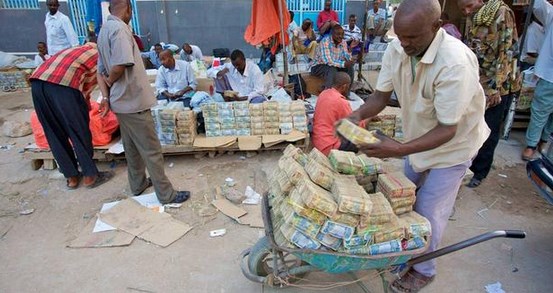
Friday December 13, 2019

Abdi-Mahad Abdullahi is one of the many small traders in Adado, in central Somalia’s Galgadud region, struggling to keep his business going because of the upheavals around the national currency, the Somali shilling.
Abdi-Mahad started as a hawker in town and managed to open his own small grocery shop in 2011 using $60 he was given by a relative.
However, all his savings were wiped out overnight in mid-2017, when the Somali shilling started to be rejected by the business community over claims that there were huge amounts of counterfeit currency in circulation.
The shilling notes he had were suddenly worthless.
“When the paper currency was stopped, I lost 55 million shillings ($2,000),” Abdi-Mahad told Radio Ergo, recalling his shock.
“I was sent right back to zero and life became very hard. When you count such losses, you don’t feel good in your mind!”
Ordinary people in places like Adado on low incomes had no access to foreign currency, namely the US dollar. With Somali shilling out of use, people were forced to use mobile money, which could not cater for very small transactions of under a dollar.
After six months unemployed and getting desperate, Abdi-Mahad borrowed $300 to set up again in retail.
“Some wholesalers I used to deal with before the shilling was rejected gave me the chance to resell their goods to see if I could make some profit. I try to make two to three dollars out of it, so I manage the family on this little money,” he said.
Another challenge is that the mobile network run by the telecommunications operator, Hormuud Telcom, which provides mobile money transfer services called EVC, suffers frequent outages.
“When you arrive at the market early in the morning and open your shop, you might serve many people but by seven o’clock the network goes down. Your customers need their goods, so there is no way you can refuse to give them to them.
We just have to write down their phone numbers and give them what they want hoping to get the money later,” he said.
With four sons and two daughters, Abdi-Mahad told Radio Ergo that he can no longer pay for education. Thankfully the school where two of his children are enrolled has exempted them from fees.
The advent of mobile money, whilst bringing efficiency for some in the absence of a stable currency, has excluded others on very low incomes.
Kheire Muse Farah, a porter, told Radio Ergo that he used to earn 200,000 shillings (then equivalent to $10) but he now gets just $3 a day, which is not enough for his family. Food prices go up every month.
He wants to see the paper Shillings brought back.
“We need to get Somali shillings because they were tangible and they were something we were satisfied with. I am unable to understand what is now used as money [EVC],” said the father of four girls and three boys.
Faduma Abdullahi, who runs a small kiosk, lost four million Somali shillings when the paper currency stopped being used. She has also struggled to understand how to make mobile transactions, especially as she was unable to read.
She told Radio Ergo that she was deceived several times by customers who ate food at her kiosk and left having pretended to pay by EVC.
“I used to hear the message tone and assume the message I received meant the money was paid,” she said.
“Later I realised I was losing money due to my naivety. I started learning Somali and mathematics so I can use my phone without worry.”